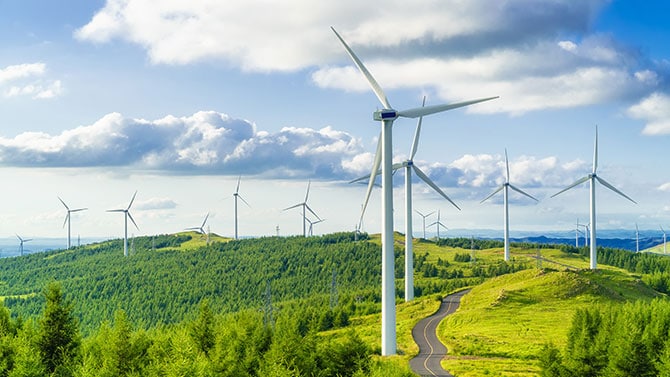We’re working towards three overarching outcome-focused goals which act as a foundation for all of our programmes and targets:
- Driving a net zero and sustainable future for ourselves, our clients and wider society.
- Accelerating a just transition by compelling our people to act sustainably, and influencing suppliers and society to think sustainably.
- Pioneering sustainability reporting, transparency and good governance.

These strategic goals support our purpose to build trust in society and solve important problems - alongside our worldwide commitment to achieve net zero greenhouse gas emissions, with near-term science-based targets set for 2030. Delivering on our corporate sustainability strategy will bring widespread benefits across our stakeholder communities and have a catalytic impact to accelerate change across society.
Our three strategic goals
Driving a net zero and sustainable future
As a responsible business we’ve been committed to reducing our impact on the planet and contributing to its restoration since 2007.
Our net zero and sustainable future programme commits us to minimise our impact on the climate, nature and the resources we consume. It’s underpinned by focus areas on net zero, clean energy optimization and security, sustainable client delivery, circular and regenerative consumption, and nature positivity. With ambitious targets set to drive systemic change in the way we operate and progress against them reported each year as part of our Annual Report.
In 2020, we made a worldwide commitment to achieve net zero greenhouse gas (GHG) emissions, with our 2030 near-term goals validated by the Science Based Target initiative. As well as decarbonising the way we operate and actively separating our business growth from our emissions, we are assisting our clients on their path to net zero and working with our suppliers to address their climate impact.
Our 2023 Annual Report highlights how our total carbon emissions have decreased by 51% since FY19, while our revenues increased by 20% over the same period. We have achieved an 87% reduction in our Scope 1 and 2 carbon emissions since FY19, surpassing our 50% reduction target. This is a result of our ongoing efforts to enhance energy efficiency in our offices through energy-saving projects and sourcing 100% of our electricity from renewable sources.
We have been supporting nature through green spaces in our buildings since 2012, creating various habitats for a range of birds and invertebrates through our green roofs, primarily in our London offices. We are now exploring how we can widen our impact. We’ve begun reporting on the proportion of our buildings across our portfolio that have a green roof and will monitor the success of these, where possible, through ecological surveys. We’re already embedding nature positive action throughout our business operations, with our people, and with clients through our new Centre for Nature Positive Business.

Accelerating a just transition
Our longstanding sustainable supply chain programme aims to deliver on our net zero commitments (through decarbonisation and nature), supporting social enterprises, whilst ensuring we manage our modern slavery risks and uphold internationally recognised human rights.
Our Annual Report explains how we've reduced our supply chain emissions spend intensity by 20% since FY19, and highlights how we have been embedding sustainability into the procurement cycle, including selection and ongoing supply chain management. We also hold an annual sustainability forum to bring our suppliers together to share our learning, priorities and explore collaboration opportunities, as well as providing more tailored support to smaller suppliers.
We encourage our people to enjoy a more sustainable lifestyle through engaging and inspiring initiatives such as the Veganuary Workplace Challenge and our Nature Network programme. We also make it as easy as possible for people to make sustainable choices through our Sustainable Living at Home Guide, which is a living library giving them easy access to sustainability information to make informed decisions.
As a firm we already have an extensive ESG learning curriculum giving in-depth training, developed by PwC, for our staff in areas such as sustainability reporting, supply chain, and climate change. We also draw on external expertise, offering an ESG leadership course and a range of training opportunities from leading institutions.

Pioneering sustainability reporting, transparency and good governance
Being transparent about our performance is a key principle that underpins our purpose. It also helps us to meet the growing expectations of our stakeholders for specific information, such as our impact data.
We measure and report transparently against a comprehensive series of metrics and targets in our Integrated Reporting Hub, supporting the narrative in our Annual Report and aligning with the WEF framework. Our Executive Board is regularly updated on our sustainability progress, and our data undergoes limited assurance to the ISAE 3000 and ISAE 3410 standards by our external financial auditors each year to ensure best in class reporting, ensuring accountability and enabling us to use it for strategic decision making.
We also oversee a number of external disclosures and standards related to sustainability, and have been recognised in several awards and benchmarks relating to responsible business, environmental performance, and supply chain management - including our outstanding Platinum EcoVadis rating.

Contact us






© 2015 - 2024 PwC. All rights reserved. PwC refers to the PwC network and/or one or more of its member firms, each of which is a separate legal entity. Please see www.pwc.com/structure for further details.












